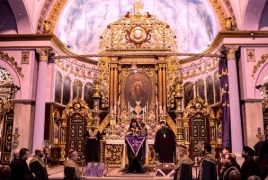Foreign Policy: Turkey must stop meddling in Armenian Church affairs January 14, 2020 - 18:46 AMT PanARMENIAN.Net - Foreign policy has unveiled a fresh article about the Turkish government's political preferences when it comes to selecting the leaders of the country's minority groups—and posing a threat to religious freedom. On December 11, Turkey’s embattled Armenian community of 70,000 elected Sahak Masalyan as the 85th patriarch of the Armenian Apostolic Church. "The patriarchal elections came 11 years too late and featured heavy-handed meddling from a Turkish government increasingly irritated by the growing list of countries that recognize the Armenian Genocide," the feature says citing the U.S. recognition of the Armenian Genocide. Mesrob Mutafyan, Turkey’s previous Armenian patriarch, died in March 2019, but he actually had been unable to fulfill leadership duties since 2008, due to early onset dementia. Given the circumstances, in January 2010, a divided Armenian community petitioned Turkey’s Interior Ministry, as lay members wished to elect a new patriarch and the clerics a co-patriarch. The Turkish government responded six months later that there was no legal basis for elections, as the current patriarch was still alive and instead called for the creation of a “deputy-general patriarch” position, taking advantage of the divisions within the Armenian community to insert itself firmly into church affairs. Archbishop Aram Atesyan, whom the Turkish government considered to be more in line with its sensibilities, assumed the role of deputy-general patriarch. "Among Turkey’s surviving minorities, Armenians perhaps know best the consequences of state interest—for good or bad—in their community and its affairs," the article says. "Turkey’s relations with Armenians at home and abroad touch on deep-rooted issues of national legitimacy and identity. Resolving these issues will require genuine outreach to Armenians at governmental and societal levels and generations to redress wrongs and heal wounds. A small step in the right direction, however, would be the recognition of legal status for Armenians and also for Greeks, Jews, and other religious minorities in Turkey—and allowing these communities to elect leaders as they see fit." The EU does not intend to conduct military exercises with Armenia, Lead Spokesperson for EU Foreign Affairs and Security Policy Peter Stano says. A telephone conversation between Putin and Pashinyan before the CSTO summit is not planned, Peskov says. London’s Armenian community has been left feeling “under attack” after the city’s Genocide monument was vandalised. The United States believes there should be an international mission to provide transparency. Partner news |